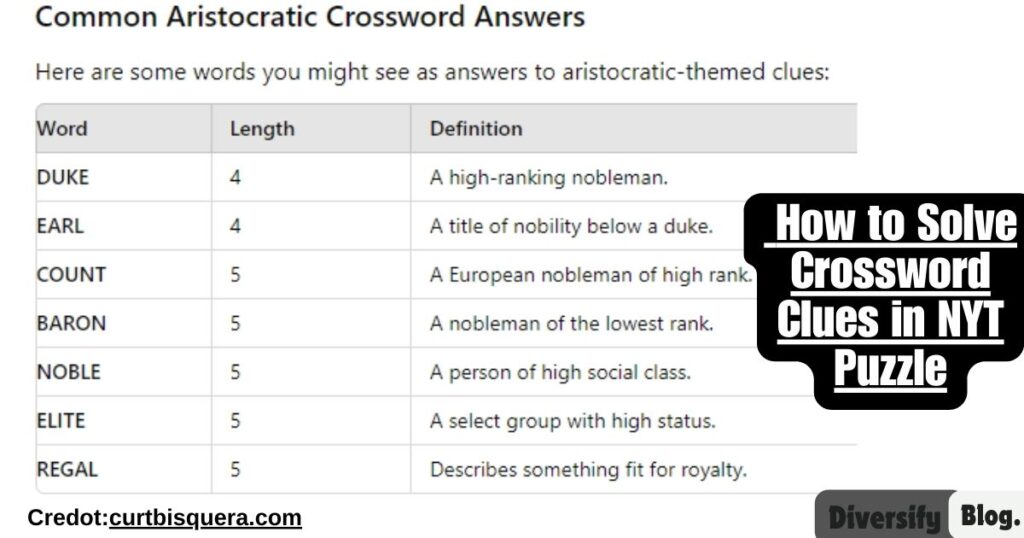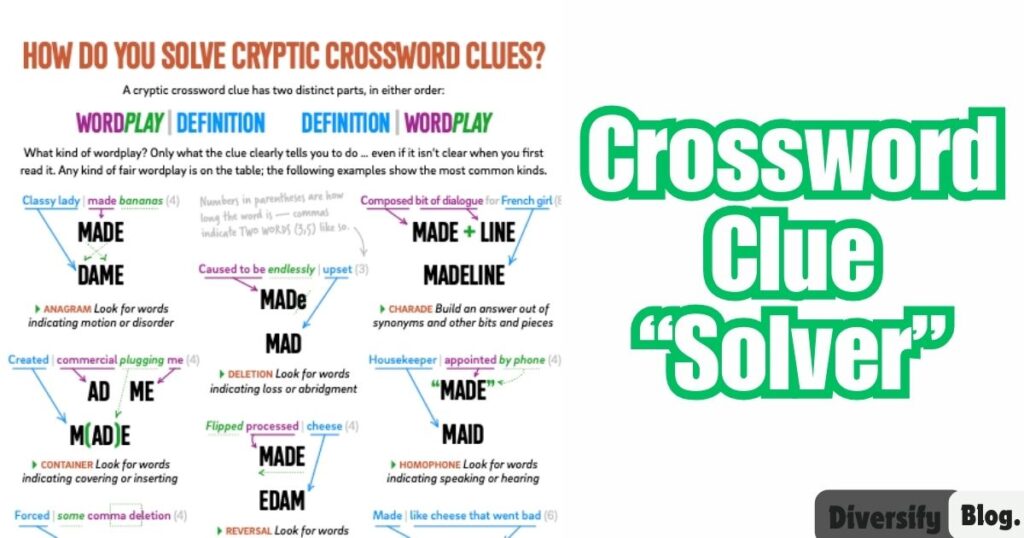Crossword Clue Guide: How to Solve Crossword Clue
If you’ve ever found yourself stuck on a crossword clue while solving the “Crossword Clue Guide: How to Solve Crossword Clue”, you’re not alone. Many crossword enthusiasts face the challenge of deciphering tricky clues, especially when it comes to words like “diminish,” “metallic element,” or “surpass.” In this comprehensive guide, we’ll walk you through some of the most common crossword clues in the NYT puzzle, providing tips and strategies to help you solve them with ease.
Crossword puzzles are a fantastic way to challenge your mind and improve your vocabulary. However, they can also be frustrating when encountering clues that seem impossible to crack. In this article, we’ll cover some of the trickiest crossword clues you’ll encounter in the NYT puzzle, including “expert,” “commotion,” “parody,” and more. Let’s dive into solving these common crossword challenges!
Table of Contents
Understanding the Aristocratic NYT Mini Crossword Clue

Aristocratic NYT Mini Crossword Clue Answers
The word “aristocratic” comes from Greek, combining “aristos,” which means “best,” and “kratos,” meaning “power” or “rule.” It refers to people from the highest social class, like nobles or those with inherited wealth and status.
In crossword puzzles, “aristocratic” usually hints at something related to high society, like royalty, nobility, or the upper class. It often points to words that describe people, qualities, or things associated with a high social standing.
Tips for Solving the Clue:
1. Look for Synonyms:
Think of words that mean the same as “aristocratic,” like “royal,” “noble,” “elite,” or “upper class.” These words often fit the clue.
2. Check Word Length and Crossings:
Pay attention to the number of letters needed and look at other clues that intersect. This can help you figure out the correct word.
3. Think Creatively:
Crossword clues can be tricky or playful. Sometimes the answer is not straightforward, so consider alternate meanings or wordplays.
4. Use Crossword Resources:
If you’re stuck, look up answers using online crossword solvers, forums, or puzzle groups. These can provide hints without giving away the answer completely.
Social Class Clues in Crosswords
“Aristocratic” is just one example of clues related to social class in crosswords. Other clues might include terms like “bourgeois” (middle class) or “proletariat” (working class). Knowing these words and what they mean can improve your crossword skills and deepen your understanding of social classes in puzzles.
Understanding the NYT Crossword Puzzle

The New York Times (NYT) crossword puzzle is renowned for its clever clues and challenging wordplay. Whether you’re a seasoned solver or a newbie, understanding the intricacies of these puzzles can significantly improve your solving experience.
How to Approach Difficult Crossword Clues
When you encounter a tough clue like “diminish” or “surpass,” it’s essential to break down the clue. Think about synonyms, wordplay, or puns that might be at play. The NYT crossword often uses subtle hints or double meanings, so consider all possibilities before settling on an answer.
Solving the “Diminish Crossword Clue”
One of the most common challenges in crossword puzzles is the “diminish crossword clue.” This clue often leads to words like “abate,” “lessen,” or “wane.” When solving this, consider synonyms that fit the number of letters required. Don’t forget to cross-check with intersecting clues for accuracy.
Tackling the “Metallic Element Crossword Clue”
Another frequent challenge is the “metallic element crossword clue.” This clue typically points to elements on the periodic table like “iron,” “gold,” or “zinc.” When you see this clue, consider common metals and how many letters are in the answer. The NYT puzzle might also use abbreviations or symbols from the periodic table, so keep those in mind.
Deciphering the “Surpass Crossword Clue”
The “surpass crossword clue” often stumps solvers, but it usually leads to answers like “exceed,” “outdo,” or “top.” These are words that convey going beyond or outperforming. When faced with this clue, consider synonyms that indicate superiority or going beyond expectations.
Dealing with the “Commotion Crossword Clue”
The “commotion crossword clue” can be tricky because it can refer to a range of disturbances. Common answers include words like “uproar,” “chaos,” or “fuss.” To solve this, think about the context of the puzzle and other clues to narrow down the options.
Solving the “Expert Crossword Clue”
When it comes to the “expert crossword clue,” words like “ace,” “pro,” or “guru” are common answers. This clue usually points to someone with a high level of skill or knowledge. If the puzzle allows, consider more specific terms like “specialist” or “master” depending on the context provided by the other clues.
Navigating the “Decree Crossword Clue”
A “decree crossword clue” typically refers to an official order or proclamation. Words like “edict,” “law,” or “ruling” often fit the bill. When solving this clue, think about legal terms or official statements that match the number of letters needed.
Understanding the “Parody Crossword Clue”
The “parody crossword clue” is another common challenge. It usually leads to answers like “spoof,” “satire,” or “lampoon.” These words describe imitations or exaggerations of something, usually for comedic effect. Keep in mind that the NYT puzzle often uses pop culture references for this clue.
Solving the “Attractive Crossword Clue”
When you see an “attractive crossword clue,” consider words like “charming,” “alluring,” or “appealing.” These are terms that describe someone or something that is pleasing to the eye. The NYT crossword might also use more abstract synonyms, so think broadly.
Handling the “Therefore Crossword Clue”
The “therefore crossword clue” often translates to words like “thus,” “hence,” or “so.” These are transition words that indicate a conclusion or result. When faced with this clue, consider how it connects to the other clues and the overall flow of the puzzle.
Strategies for Improving Your Crossword Skills
Now that we’ve covered specific clues, let’s discuss strategies for improving your overall crossword-solving skills:
Practice Regularly: The more puzzles you solve, the better you’ll get at recognizing patterns and common clues.
Expand Your Vocabulary: Reading widely and learning new words can greatly improve your crossword skills.
Use a Thesaurus: Sometimes, finding synonyms can help you solve tricky clues more easily.
Work on Cross-Referencing: Always consider intersecting clues to help confirm your answers.
Take Breaks: If you’re stuck on a clue, take a break and come back to it with fresh eyes.
People Also Asked:
Questions and Answers
1. What is a common answer for the diminish crossword clue?
Common answers for the *diminish crossword clue* include “abate,” “lessen,” and “wane.” These words all convey the idea of reducing in size, amount, or intensity.
2. Which metallic element crossword clue often appears in puzzles?
For the “metallic element crossword clue”, common answers are “iron,” “gold,” “zinc,” and “silver.” These are frequently used in crossword puzzles due to their common occurrence and simple names.
3. How can I solve the surpass crossword clue in the NYT puzzle?
To solve the “surpass crossword clue” in the NYT puzzle, look for synonyms like “exceed,” “outdo,” and “top.” These words indicate going beyond or outperforming something or someone.
4. What are possible answers for the commotion crossword clue?
Possible answers for the “commotion crossword clue” include “uproar,” “chaos,” and “fuss.” These words describe various types of noisy disturbances or disruptions.
5. What is the best way to figure out the expert crossword clue?
The best approach for the *expert crossword clue* is to think of terms like “ace,” “pro,” and “guru.” These words represent someone with a high level of skill or expertise in a particular area.
6. How should I interpret the decree crossword clue in a puzzle?
For the “decree crossword clue”, you should consider terms like “edict,” “law,” and “ruling.” These words denote an official order or proclamation issued by an authority.
7. What are typical answers for the parody crossword clue?
Typical answers for the “parody crossword clue” include “spoof,” “satire,” and “lampoon.” These terms refer to humorous or exaggerated imitations of something for comedic effect.
8. How do I solve the attractive crossword clue in a crossword?
To solve the “attractive crossword clue”, think of adjectives like “charming,” “alluring,” and “appealing.” These words describe something or someone that is pleasing to the eye or attractive.
9. What are some common solutions for the therefore crossword clue?
Common solutions for the “therefore crossword clue” include “thus,” “hence,” and “so.” These words are used to indicate a conclusion or result based on what has been previously mentioned.
Conclusion
Solving the NYT crossword puzzle can be a rewarding experience, especially when you master the art of deciphering tricky clues. Whether you’re struggling with the “metallic element crossword clue” or trying to crack the “diminish crossword clue,” this guide provides you with the tools you need to succeed. Remember, practice makes perfect, and with time, you’ll become an expert at tackling even the most challenging crossword puzzles




















2 Comments
Your comment is awaiting moderation.
Betriot Casino e la scelta perfetta per i giocatori italiani https://betriot-it.it con promozioni speciali per i giocatori italiani.
Your comment is awaiting moderation.
Ανακαλύψτε το BoaBoa καζίνο online για μια αξέχαστη εμπειρία τυχερών παιχνιδιών στην Ελλάδα
Your comment is awaiting moderation.
Ενδιαφέρεστε για το καζίνο Casinoly ; Ανακαλύψτε τα πάντα για αυτό το διαδικτυακό καζίνο
Your comment is awaiting moderation.
Μόλις ανακάλυψα το Nomini Casino στην Ελλάδα. Επισκεφθείτε το Nomini Casino για να απολαύσετε μια μοναδική εμπειρία τυχερών παιχνιδιών.
Your comment is awaiting moderation.
Δοκιμάστε το Kingmaker Casino στην Ελλάδα! Καζίνο Kingmaker εγγυάται ασφάλεια και αξιοπιστία για τους Έλληνες παίκτες.
Your comment is awaiting moderation.
Για αξιόπιστο διαδικτυακό καζίνο στην Ελλάδα, δοκιμάστε Kingmaker Casino Greece που προσφέρει μοναδικές εμπειρίες παιχνιδιού.
Your comment is awaiting moderation.
δείτε τις προσφορές Καλώς ήρθατε στο Leon Bet Greece και ανακαλύψτε γιατί είναι δημοφιλές στην Ελλάδα.
Your comment is awaiting moderation.
Ανακαλύψτε ένα αξιόπιστο καζίνο για Έλληνες παίκτες? Επισκεφθείτε Leon Casino Ελλάδα για να απολαύσετε στην ελληνική αγορά.
Your comment is awaiting moderation.
Απολαύστε μοναδικές εμπειρίες παιχνιδιού στο ependisinews.gr BoaBoa: το αγαπημένο καζίνο των Ελλήνων και απολαύστε την αυθεντική ελληνική εμπειρία παιχνιδιού
Your comment is awaiting moderation.
newsacademies.gr
Your comment is awaiting moderation.
The Stake Casino gameathlon.gr is among the best online gambling platforms since it integrated crypto into its transactions early on.
Online gambling platforms is growing rapidly and there are many options, not all online casinos provide the same quality of service.
In this article, we will take a look at top-rated casinos available in the Greek market and the advantages for players who live in Greece.
The top-rated casinos of 2023 are shown in the table below. Here are the highest-rated casinos as rated by our expert team.
For any online casino, it is essential to verify the validity of its license, software certificates, and data protection measures to ensure safety for players on their websites.
If any important details are missing, or if we can’t confirm any of these elements, we avoid that platform.
Software providers are crucial in selecting an online casino. Generally, if there’s no valid license, you won’t find reliable providers like NetEnt represented on the site.
Top-rated online casinos offer both traditional payment methods like Visa, and they should also offer electronic payment methods like Paysafecard and many others.
Your comment is awaiting moderation.
На территории Российской Федерации сертификация имеет большое значение в обеспечении качества и безопасности товаров и услуг. Она необходима как для производителей, так и для потребителей. Документ о сертификации гарантирует соответствие товара нормам и требованиям. Это особенно важно в таких отраслях, как пищевая промышленность, строительство и медицина. Сертификация помогает повысить доверие к бренду. Также это часто является обязательным условием для выхода на рынок. В итоге, сертификация способствует развитию бизнеса и укреплению позиций на рынке.
сертификация товаров
Your comment is awaiting moderation.
На территории Российской Федерации сертификация играет важную роль для подтверждения соответствия продукции установленным стандартам. Она необходима как для производителей, так и для потребителей. Документ о сертификации гарантирует соответствие товара нормам и требованиям. Это особенно важно в таких отраслях, как пищевая промышленность, строительство и медицина. Прошедшие сертификацию компании чаще выбираются потребителями. Кроме того, это часто является обязательным условием для выхода на рынок. В итоге, соблюдение сертификационных требований обеспечивает стабильность и успех компании.
сертификация качества
Your comment is awaiting moderation.
На территории Российской Федерации сертификация играет важную роль в обеспечении качества и безопасности товаров и услуг. Она необходима как для бизнеса, так и для конечных пользователей. Документ о сертификации гарантирует соответствие товара нормам и требованиям. Особенно это актуально в таких отраслях, как пищевая промышленность, строительство и медицина. Сертификация помогает повысить доверие к бренду. Также это часто является обязательным условием для выхода на рынок. Таким образом, сертификация способствует развитию бизнеса и укреплению позиций на рынке.
https://ascendio-corporate.com/profile.php?user=susanne.levi-402423&mod=space&from=space
Your comment is awaiting moderation.
На этом сайте у вас есть возможность приобрести онлайн телефонные номера разных операторов. Эти номера подходят для регистрации профилей в различных сервисах и приложениях.
В ассортименте представлены как постоянные, так и одноразовые номера, которые можно использовать для получения сообщений. Это простое решение если вам не желает указывать основной номер в интернете.
номер для телеграмма
Процесс покупки очень удобный: определяетесь с необходимый номер, вносите оплату, и он становится доступен. Попробуйте сервис прямо сейчас!
Your comment is awaiting moderation.
Для эффективного мониторинга и анализа видеопотока используются специальные программы. Они позволяют удаленно управлять камерами, сохранять записи и настраивать оповещения. Выбор подходящего софта зависит от задач и особенностей системы наблюдения. Подробнее о программах для видеонаблюдения можно узнать на сайте.
[…] Crossword Clue Guide: How to Solve Crossword Clue in NYT Puzzle […]
[…] Crossword Clue Guide: How to Solve Crossword Clue in NYT Puzzle […]